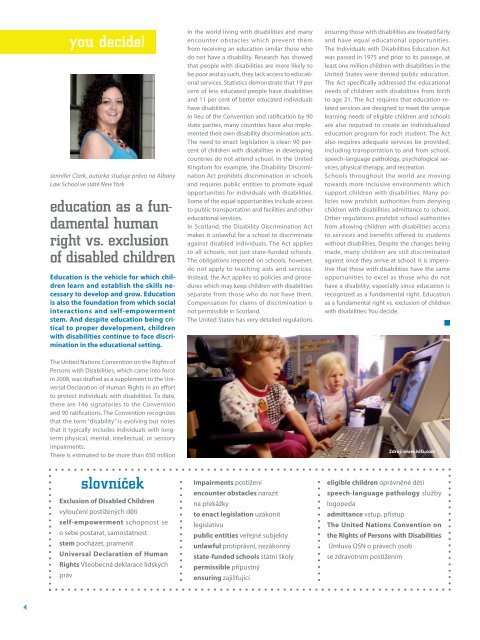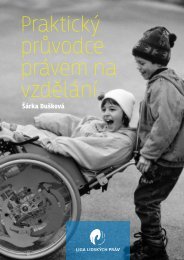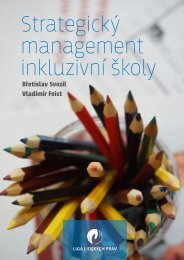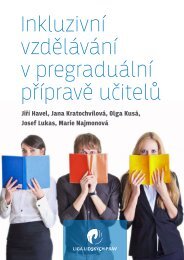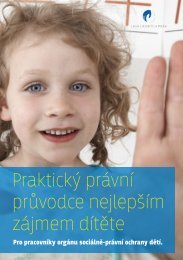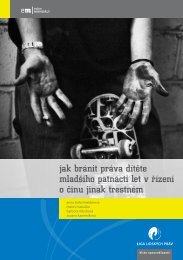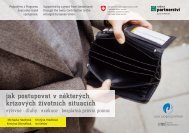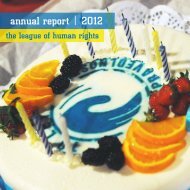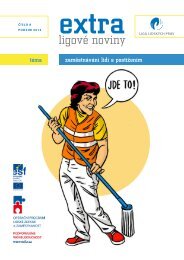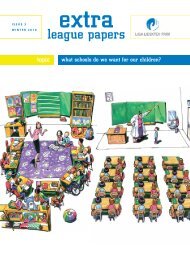EXTRA ligové noviny | číslo 3 | zima 2010 | Jaké školy chceme pro naše děti?
V tomto čísle se věnujeme dětem, jejich právu na kvalitní vzdělání a život v rodině. Dozvíte se o problematice zvláštních škol, o systému inkluzivního vzdělávání a také o způsobu, jakým se Česká republika (ne)vyrovnává se závazkem spravedlivého přístupu ke vzdělání.
V tomto čísle se věnujeme dětem, jejich právu na kvalitní vzdělání a život v rodině. Dozvíte se o problematice zvláštních škol, o systému inkluzivního vzdělávání a také o způsobu, jakým se Česká republika (ne)vyrovnává se závazkem spravedlivého přístupu ke vzdělání.
Create successful ePaper yourself
Turn your PDF publications into a flip-book with our unique Google optimized e-Paper software.
4<br />
you decide!<br />
Jennifer Clark, autorka studuje právo na Albany<br />
Law School ve státě New York<br />
education as a fundamental<br />
human<br />
right vs. exclusion<br />
of disabled children<br />
Education is the vehicle for which children<br />
learn and establish the skills necessary<br />
to develop and grow. Education<br />
is also the foundation from which social<br />
interactions and self-empowerment<br />
stem. And despite education being critical<br />
to <strong>pro</strong>per development, children<br />
with disabilities continue to face discrimination<br />
in the educational setting.<br />
The United Nations Convention on the Rights of<br />
Persons with Disabilities, which came into force<br />
in 2008, was drafted as a supplement to the Universal<br />
Declaration of Human Rights in an eff ort<br />
to <strong>pro</strong>tect individuals with disabilities. To date,<br />
there are 146 signatories to the Convention<br />
and 90 ratifi cations. The Convention recognizes<br />
that the term “disability” is evolving but notes<br />
that it typically includes individuals with longterm<br />
physical, mental, intellectual, or sensory<br />
impairments.<br />
There is estimated to be more than 650 million<br />
slovníček<br />
Exclusion of Disabled Children<br />
vyloučení postižených dětí<br />
self-empowerment schopnost se<br />
o sebe postarat, samostatnost<br />
stem pocházet, pramenit<br />
Universal Declaration of Human<br />
Rights Všeobecná deklarace lidských<br />
práv<br />
in the world living with disabilities and many<br />
encounter obstacles which prevent them<br />
from receiving an education similar those who<br />
do not have a disability. Research has showed<br />
that people with disabilities are more likely to<br />
be poor and as such, they lack access to educational<br />
services. Statistics demonstrate that 19 per<br />
cent of less educated people have disabilities<br />
and 11 per cent of better educated individuals<br />
have disabilities.<br />
In lieu of the Convention and ratifi cation by 90<br />
state parties, many countries have also implemented<br />
their own disability discrimination acts.<br />
The need to enact legislation is clear: 90 percent<br />
of children with disabilities in developing<br />
countries do not attend school. In the United<br />
Kingdom for example, the Disability Discrimination<br />
Act <strong>pro</strong>hibits discrimination in schools<br />
and requires public entities to <strong>pro</strong>mote equal<br />
opportunities for individuals with disabilities.<br />
Some of the equal opportunities include access<br />
to public transportation and facilities and other<br />
educational services.<br />
In Scotland, the Disability Discrimination Act<br />
makes it unlawful for a school to discriminate<br />
against disabled individuals. The Act applies<br />
to all schools, not just state-funded schools.<br />
The obligations imposed on schools, however,<br />
do not apply to teaching aids and services.<br />
Instead, the Act applies to policies and <strong>pro</strong>cedures<br />
which may keep children with disabilities<br />
separate from those who do not have them.<br />
Compensation for claims of discrimination is<br />
not permissible in Scotland.<br />
The United States has very detailed regulations<br />
impairments postižení<br />
encounter obstacles narazit<br />
na překážky<br />
to enact legislation uzákonit<br />
legislativu<br />
public entities veřejné subjekty<br />
unlawful <strong>pro</strong>tiprávní, nezákonný<br />
state-funded schools státní <strong>školy</strong><br />
permissible přípustný<br />
ensuring zajišťující<br />
ensuring those with disabilities are treated fairly<br />
and have equal educational opportunities.<br />
The Individuals with Disabilities Education Act<br />
was passed in 1975 and prior to its passage, at<br />
least one million children with disabilities in the<br />
United States were denied public education.<br />
The Act specifi cally addressed the educational<br />
needs of children with disabilities from birth<br />
to age 21. The Act requires that education-related<br />
services are designed to meet the unique<br />
learning needs of eligible children and schools<br />
are also required to create an individualized<br />
education <strong>pro</strong>gram for each student. The Act<br />
also requires adequate services be <strong>pro</strong>vided,<br />
including transportation to and from school,<br />
speech-language pathology, psychological services,<br />
physical therapy, and recreation.<br />
Schools throughout the world are moving<br />
towards more inclusive environments which<br />
support children with disabilities. Many policies<br />
now <strong>pro</strong>hibit authorities from denying<br />
children with disabilities admittance to school.<br />
Other regulations <strong>pro</strong>hibit school authorities<br />
from allowing children with disabilities access<br />
to services and benefits offered to students<br />
without disabilities. Despite the changes being<br />
made, many children are still discriminated<br />
against once they arrive at school. It is imperative<br />
that those with disabilities have the same<br />
opportunities to excel as those who do not<br />
have a disability, especially since education is<br />
recognized as a fundamental right. Education<br />
as a fundamental right vs. exclusion of children<br />
with disabilities: You decide.<br />
Zdroj: www.isifa.com<br />
eligible children oprávněné <strong>děti</strong><br />
speech-language pathology služby<br />
logopeda<br />
admittance vstup, přístup<br />
The United Nations Convention on<br />
the Rights of Persons with Disabilities<br />
Úmluva OSN o právech osob<br />
se zdravotním postižením


